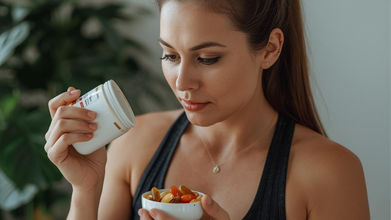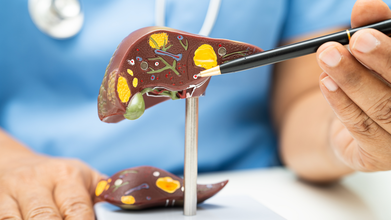- Health Conditions A-Z
- Health & Wellness
- Nutrition
- Fitness
- Health News
- Ayurveda
- Videos
- Medicine A-Z
- Parenting
Why Is Cholesterol Important? Role Of LDL And HDL In Heart Health Function

cholestrol (Credit:Canva)
Cholesterol often carries a negative connotation, but it plays an essential role in maintaining overall health, particularly heart health. Cholesterol is a waxy substance found in every body cell and is crucial for producing hormones, vitamin D, and bile acids that help digest fat. However, not all cholesterol is created equal. It is important to differentiate between "good" and "bad" cholesterol to understand its impact on heart health.
The Good vs. The Bad
Cholesterol travels through the bloodstream in particles called lipoproteins. The two primary types are Low-Density Lipoprotein (LDL) and High-Density Lipoprotein (HDL).- LDL Cholesterol: Often referred to as "bad" cholesterol, high levels of LDL can lead to plaque buildup in the arteries, increasing the risk of cardiovascular diseases such as heart attacks and strokes. According to a study published in the *Journal of the American College of Cardiology*, individuals with elevated LDL levels are at a significantly higher risk for coronary heart disease.
- HDL Cholesterol: In contrast, HDL is known as "good" cholesterol. It helps remove other forms of cholesterol from the bloodstream, transporting it to the liver for excretion. Higher levels of HDL cholesterol are associated with a lower risk of heart disease. A study conducted by the American Heart Association found that individuals with high HDL levels experienced a 25% reduction in heart disease risk compared to those with low levels.
Cholesterol's Role in Heart Health
Cholesterol is vital for several bodily functions, including:
1. Cell Membrane Structure: Cholesterol is a critical component of cell membranes, providing stability and fluidity, which are essential for cell function.
2. Hormone Production: It serves as a precursor for the synthesis of steroid hormones, including cortisol, estrogen, and testosterone, which regulate various bodily functions.
3. Vitamin D Synthesis: Cholesterol is necessary for the body to produce vitamin D, which is essential for bone health and immune function.
4. Bile Acid Production: Cholesterol is converted into bile acids in the liver, aiding in fat digestion and absorption.
Maintaining Healthy Cholesterol Levels
To maintain a healthy balance between LDL and HDL cholesterol, consider the following lifestyle changes:
- Eat a Heart-Healthy Diet: Incorporate fruits, vegetables, whole grains, and healthy fats while reducing saturated fats and trans fats found in processed foods.
- Exercise Regularly: Physical activity can help raise HDL levels and lower LDL levels.
- Avoid Tobacco Smoke: Smoking lowers HDL cholesterol and increases the risk of heart disease.
- Regular Health Check-ups: Monitoring cholesterol levels through regular blood tests can help identify risks early.
Prenatal Vitamins vs Multivitamins: Experts Reveal What Women Need

Credit: Canva
While you may have seen multiple women, who are not pregnant, taking prenatal vitamins to improve their skin, hair and nail quality, experts say you should steer clear and only stick to multivitamins to ensure your body stays healthy all-year round.
Prenatal vitamins are daily supplements for women who are pregnant or trying to get pregnant. These supplements contain the vitamins and minerals you need to support healthy fetal development, according to the Cleveland Clinic.
Dr Rohan Palshetkar, Consultant IVF Specialist, Bloom IVF tells Healthandme: ""Prenatal vitamin should be taken three months at least prior to the pregnancy or basically whenever you begin to start planning the pregnancy, ensure that all your micro nutrients as well as your folic acid levels are up to the normal mark so as to ensure that your baby has a healthy growth"
But when your body doesn't need it, taking supplements could put you at risk over time.
Which Vitamins And Minerals Are Prenatal Vitamins Rich In?
As per the American College of Obstetricians and Gynecologists (ACOG), here are the most important nutrients prenatal vitamins are packed with:
Folic Acid: One of the most important prenatal nutrients, this B vitamin is important as it creates your baby's neural tube. This is the structure that eventually forms brain. As per the US Preventive Services Task Force, folic acid supplements significantly increase the growth of healthy neural tube. The American Academy of Pediatrics also notes that it helps the neural tube to protect from defects by 50 percent.
Iron: It supplies blood and oxygen to the fetus and also helps build the placenta. It also gives the mother extra blood volume that you need throughout pregnancy. Pregnant people are prone to anemia, this is why iron supplementation is a must.
Calcium: The most time spend in uterus for a baby is invested in building their bones and teeth, this is a Herculean task, and requires the mother to have plenty of calcium. If you don't have enough calcium, then your baby will utilise the calcium from your body, which could lead to temporary bone loss.
Certain prenatal supplements also contain other additives such as omega-3 fatty acids.
Why Is It Dangerous To Take Prenatal Vitamins
The main difference between a prenatal vitamin and a multivitamin is the concentration of folic acid and iron.
Ingesting enough folate from food or folic acid from supplements at the start of a pregnancy lowers the risk of certain birth defects. Along with this, iron supplements help the body make the extra blood cells needed during pregnancy.
The amount of folic acid suggested for people who are planning a pregnancy is 400 to 800 micrograms (mcg) a day. The amount of iron needed in pregnancy is 27 milligrams (mg) a day.
The typical amount of folic acid for an non-pregnant adult is 400 mcg a day. For iron, the typical daily amount is 8 mg for males and 18 mg for females.
Taking iron and folic acid at levels higher than the suggested amounts may bump people closer to the upper limit for these nutrients which can raise the risk of health problems.
Taking too much folic acid, especially over 1,000 mcg daily without a doctor's advice, can mask a vitamin B12 deficiency, potentially causing irreversible nerve damage and may lead to side effects such as bitter taste, nausea or sleep problems, with potential links to increased risks in pregnancy like autism or insulin resistance.
Eating too much iron, especially from supplements, can cause acute iron poisoning, leading to severe nausea, vomiting, abdominal pain, diarrhea and bloody stools. Long-term excessive intake causes iron to deposit in tissues, causing iron overload (hemochromatosis) that damages the liver (cirrhosis), heart (failure), and pancreas (diabetes) and may cause a bronze skin color.
Team USA Transformed Mental Health Support For Olympics, This Is How

Credits: iStock
The Olympic Games are often seen as the ultimate celebration of human endurance, discipline and perfection. But behind the glittering medals, roaring crowds and emotional national anthems lies a quieter, more personal struggle many athletes carry with them, their mental health.
As the 2026 Winter Olympics in Milano Cortina draw closer, officials from the United States Olympic & Paralympic Committee (USOPC) are acknowledging a reality that has long remained in the shadows. According to the organization’s chief medical officer, Jonathan Finnoff, nearly half of U.S. Olympic athletes and 60 percent of Paralympic athletes are expected to experience symptoms linked to mental health concerns while preparing for or competing in the Games. These numbers highlight how elite sports, despite its glamour, can place enormous emotional and psychological pressure on athletes.
The Growing Recognition Of Mental Health In Elite Sports
Over the years, conversations around athlete well-being have shifted significantly. Earlier, the focus remained heavily on physical fitness and performance, while emotional struggles were often dismissed as signs of weakness. Today, sports bodies are beginning to understand that mental fitness is just as important as physical conditioning.
In response, the USOPC has introduced a wide range of support systems. These include hiring specialized professionals trained in both mental health care and performance psychology, creating virtual consultation services, and introducing structured screening programmes to identify athletes who may require additional support. Officials claim that the programme has grown into a comprehensive support network designed to assist athletes before, during and after competitions.
However, these initiatives have not emerged without criticism. Reports and athlete testimonies over the years have pointed towards gaps in earlier mental health care systems within competitive sports. The issue gained global attention when several high-profile athletes openly spoke about their struggles.
Simone Biles And The Turning Point
One of the most defining moments in this conversation occurred during the Tokyo Olympics in 2021, when American gymnast Simone Biles withdrew from the individual all-around final after experiencing what gymnasts refer to as “the twisties”, a dangerous mental block that disrupts spatial awareness mid-performance.
Her decision sparked global debate and encouraged many athletes to speak openly about psychological challenges. Prominent sportspersons from different disciplines followed suit, helping dismantle long-standing stigma around mental health in professional sports.
Following these developments, the USOPC significantly expanded its psychological services, increasing the number of licensed professionals and strengthening its support infrastructure. Additional funding from private foundations further helped expand mental health resources available to athletes.
Life After The Spotlight: The Emotional Void Athletes Face
For many athletes, the psychological strain does not end with the competition. Olympic freestyle skier Nick Goepper has spoken openly about his personal struggles with depression, substance abuse and feelings of purposelessness after major sporting events.
Athletes often dedicate their entire lives to reaching the Olympic stage. Once the event concludes, many find themselves grappling with identity crises and emotional emptiness. The sudden transition from global recognition to everyday routine can be deeply unsettling, especially when athletes begin questioning their purpose beyond sport.
Mental health professionals working with Olympic teams now recognize that athletes are not only dealing with performance pressure but also navigating personal life challenges, grief, injuries and major life transitions during their careers.
Balancing Performance And Well-being
While global sponsors and sporting organizations continue to prioritize medal tallies, there is growing acknowledgement that long-term athletic success cannot be separated from mental well-being. Psychological services within Olympic teams now focus not only on improving performance but also on helping athletes manage stress, trauma and life challenges.
Experts working with Olympic teams note that mental health support often extends beyond competition preparation. Athletes may seek counselling for personal losses, relationship struggles or major life changes, all of which can affect performance and overall well-being.
A Cultural Shift In Sports
The evolving approach toward athlete mental health reflects a broader cultural change in competitive sports. Open conversations, improved medical support and athlete-led advocacy are slowly transforming how mental health is perceived in elite sporting environments.
As the Milano Cortina Games approach, the spotlight will undoubtedly remain on record-breaking performances and medal counts. Yet, an equally important story will unfold behind the scenes — one where athletes, coaches and sports organizations work together to ensure that champions are supported not just physically, but emotionally as well.
Indians Are At Most Risk Of Having Fatty Liver Disease, According To Doctor

Credits: Canva
Non-alcoholic fatty liver disease, often called fatty liver, occurs when excess fat builds up in the liver due to reasons unrelated to alcohol consumption. Multiple studies suggest that nearly 35 to 40 percent of Indian adults may already be living with fatty liver disease. Experts believe this figure could be a conservative estimate, making it a growing public health concern.
What is even more worrying is that Indians are significantly more prone to developing fatty liver disease compared to many other ethnic groups.
A Genetic Link Rooted in Survival
Dr Alok Chopra, a cardiologist and functional medicine expert with over four decades of experience, recently explained in an Instagram video why Indians are disproportionately affected.
“This is not just about junk food or sitting all day,” Dr Chopra said. “People from the Indian subcontinent developed a survival mechanism over generations of famine. Our bodies learned to store fat quickly, especially in the liver, to protect us during periods of starvation.”
According to him, this genetic adaptation has outlived its usefulness in modern times. “The famine disappeared, but the genetic switch never turned off,” he explained. “That is why today nearly one in three Indians is estimated to have fatty liver disease, and the real number may actually be closer to half the population.”
Why Fatty Liver Often Goes Unnoticed
Fatty liver disease is often called a silent condition because it may not cause obvious symptoms in its early stages. Many people discover it accidentally during routine blood tests or ultrasound scans. If left unchecked, it can progress to liver inflammation, fibrosis, or even cirrhosis.
Dr Chopra warns that ignoring early signs can be risky, but he also offers reassurance.
The Liver Can Heal If Given the Right Support
“The good news is that fatty liver is one of the most reversible conditions,” he said. “The liver is a remarkable organ. It detoxifies, regenerates, and supports metabolism, hormones, and energy. But it needs the right environment to heal.”
According to him, early action through lifestyle and nutrition changes can make a significant difference before the disease progresses.
Three Simple Steps to Reverse Fatty Liver
Dr Chopra outlines three key strategies to support liver health.
First, he advises aligning eating habits with the body’s natural rhythms. “Eat your dinner early, avoid late-night snacking, and include periods of intermittent fasting,” he said. “This is how our ancestors naturally lived.”
Second, he stresses the importance of cooking fats. “Your grandmom was right,” he noted. “Use ghee instead of refined seed oils. Bad oils, corn syrups, and highly processed foods push the liver towards inflammation and fat storage.”
Lastly, he highlights antioxidants. “Glutathione is the body’s master antioxidant,” Dr Chopra explained. “You can also support it with berries, dark leafy greens like spinach and kale, colorful vegetables, and even coffee, which research shows can lower the risk of fatty liver.”
With awareness and timely action, fatty liver disease does not have to be permanent.
Note: This is a user-generated content available publicly. It is not a substitute of medical consultation.
© 2024 Bennett, Coleman & Company Limited

